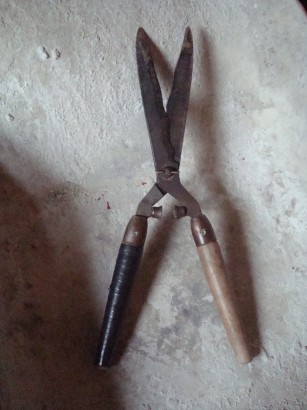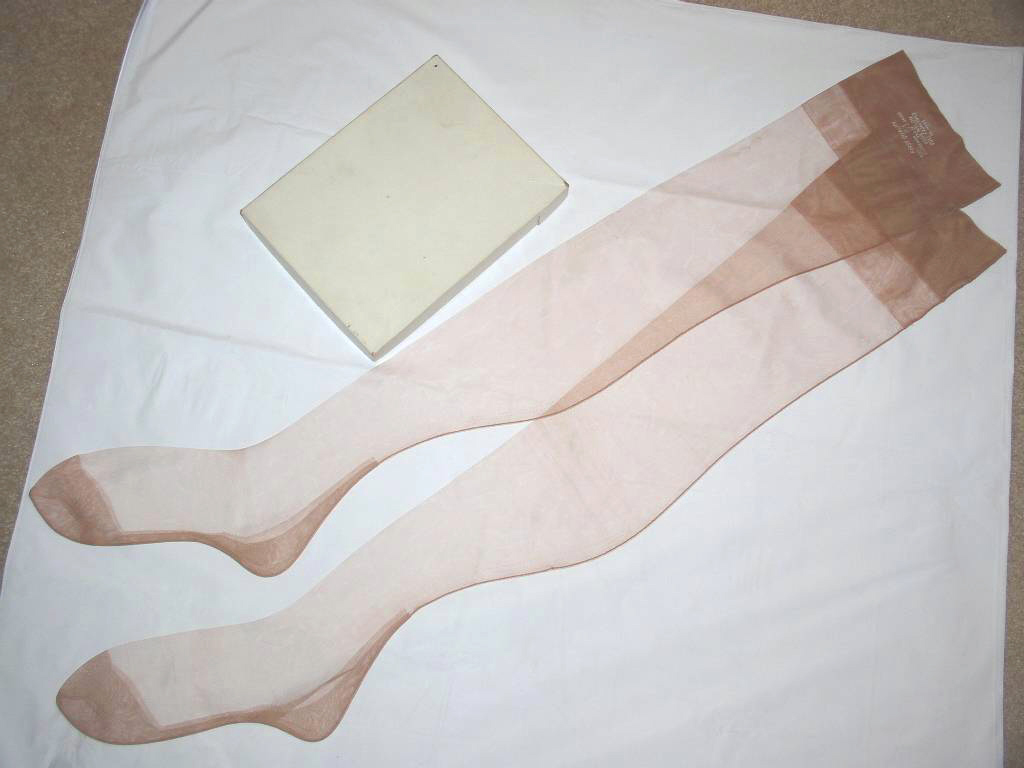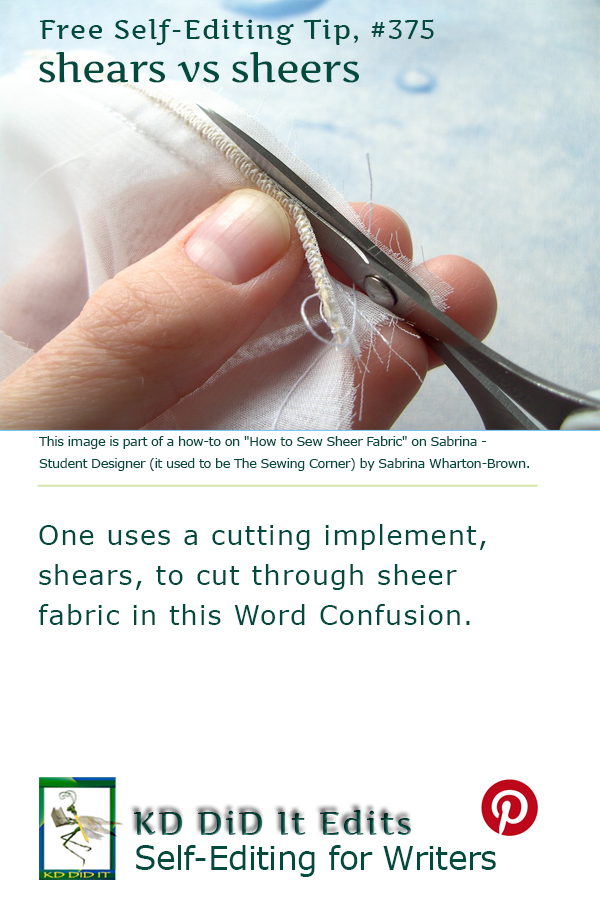The slicing nature of shears to the delicacy of sheers. It’s such a contrast of purpose from the hardness of a cutting implement to the daintiness of a transparent fabric.
I suppose the sheer drop could compete against the shear break or shift of a structure, but it’s a strain.
Word Confusions . . .
. . . started as my way of dealing with a professional frustration with properly spelled words that were out of context in manuscripts I was editing as well as books I was reviewing. It evolved into a sharing of information with y’all. I’m hoping you’ll share with us words that have been a bête noire for you from either end.
If you found this post on “Shears versus Sheers” interesting, consider subscribing to KD Did It, if you’d like to track this post for future updates.
| Shears | Sheers |
|---|---|
 — |
 |
| Part of Grammar: | |
| Noun 1; Plural noun 1; Verb 2, intransitive & transitive Plural noun: shears Third person present verb: shears |
Adjective 1; Adverb 1 Noun 1, 3; Plural noun 1; Verb 2, intransitive & transitive Plural noun: sheers Third person present verb: sheers |
| Cut, break off
Noun: Strain in the structure of a substance produced by pressure when its layers are laterally shifted in relation to each other 1 Plural noun: Scissors used for tailoring Garden shears Verb, intransitive: To progress by or as if by cutting [Mechanics, Geology] To become fractured along a plane as a result of forces acting parallel to the plane [Chiefly Scottish] To reap crops with a sickle Verb, transitive: Cut something off with scissors or shears Break off or cause to break off owing to a structural strain |
Adjective: [Attrib.] Nothing other than unmitigated (used for emphasis) 1 [Of a fabric] Very thin, diaphanous Perpendicular or nearly so [British; obsolete] Bright
Adverb:
[Archaic] Completely
Noun: A sudden deviation from a course [Shipbuilding] The curved fore and aft line formed by the uppermost plank of a boat 3 [Nautical] Position of a vessel riding toward its anchor Plural noun: [Nautical] An apparatus consisting of two masts, or legs, secured together at the top, and provided with ropes or chains and pulleys Verb, intransitive:
Verb, transitive: [Shipbuilding] To give sheer to a hull |
| Examples: | |
| Noun: The wind shear is bad at this altitude. Shear forces often result in shear strain. Plural noun: Get the hedge shears. Pauline has sewing shears and paper ones. Verb, intransitive: Shear stress results in slippage and translation (Tulane University). Along some faults, rocks are sheared or drawn out by ductile deformation along the fault (Tulane University). We’ll be shearing the crops soon. Get those sheep sheared. The derailleur sheared and jammed in the rear wheel. Verb, transitive: In that last recession, the richest man in the US was shorn of nearly $2 billion. That bolt was almost completely sheared off. |
Adjective: The sheer gall of the man! They used a sheer, white chiffon for the curtains. she giggled with sheer delight. Marriage is sheer hard work. The sheer ice walls loomed above us. Adverb: She went sheer forward when the door was open. Noun: We took a sheer back to port. She took a big sheer to starboard. Her sheer broke when she swung right. Plural noun: “The sheers has one motion on its steps describing an arc, and is inclined from the perpendicular to a greater or less extent as required, by slacking or hauling on the guy-rope or fall of the sheer-tackle” (Knight, 2,141). Verb, intransitive: Her mind sheered away from images she didn’t want to dwell on. Verb, transitive: He sheered off from the topic. “Shoot the ship ahead of her anchor, or sheer her clear of it, upon the same tack as she is meant to shoot up the next tide . . .” (Blunt, 85). |
| Derivatives: | |
| Adjective: shearless Noun: shearer, shearleg |
Adjective: sheerer, sheerest Adverb: sheerly Noun: sheer clamp, sheer strake, sheerness |
| History of the Word: | |
|
|
C’mon, get it out of your system, bitch, whine, moan . . . which words are your pet peeves? Also, please note that I try to be as accurate as I can, but mistakes happen or I miss something. Email me if you find errors, so I can fix them . . . and we’ll all benefit!
Satisfy your curiosity about other Word Confusions on its homepage or more generally explore the index of self-editing posts. You may also want to explore Book Layout & Formatting Ideas, Formatting Tips, Grammar Explanations, Linguistics, Publishing Tips, the Properly Punctuated, Writing Ideas and Resources, and Working Your Website.
Resources for Shears versus Sheers
Some of these links may be affiliate links, and I will earn a small percentage, if you should buy it. It does not affect the price you pay.
Apple Dictionary.com
Blunt, Edmund March. Seamanship, Both in Theory and Practice: To Which is Annexed, an Essay on Naval Tactics and Signals: Also, Regulations for the Government of the Navy of the United States of America . . .: Including Also, Forms of General and Particular Orders for. Andesite Press, 2015. Print. <https://amzn.to/3SuNOq6>.
DeMerchant, Christine. “Nautical Terms Relating to Boat Hulls and Boatbuilding.” n.d. Web. n.d. <http://www.christinedemerchant.com/nautical-terms-hull.html>.
Dictionary.com: shear
Knight, Edward Henry. Knight’s American Mechanical Dictionary: A Description of Tools, Instruments, Machines, Processes, and Engineering; History of Inventions; General Technological Vocabulary; and Digest of Mechanical Appliances in Science and the Arts. vol. 3. Houghton Mifflin, Boston: 1884. Print. <https://amzn.to/3EeRoR3> or Google Books, <https://bit.ly/3USGfeu> . . . If you’re interested in tons more nautical terms using sheer . . .
Pinterest Photo Credits:
The image is part of a how-to on “How to Sew Sheer Fabric” on Sabrina – Student Designer (it used to be The Sewing Corner) by Sabrina Wharton-Brown and with her permission.
Revised as of 18 Apr 2024
By: Kathy Davie


I used to always get these two mixed up!
Bookmark this one! And feel better than you are NOT alone! k
I did!
Lol, good for you!
Just got to thinking of another trick to help differentiate between the two words. The shears has an a that needs cutting while sheers has already been cut. Whaddya think?
I like it!
I’ll have to add that in to the shears versus sheers on the website. Thanks for kicking my imagination in gear!